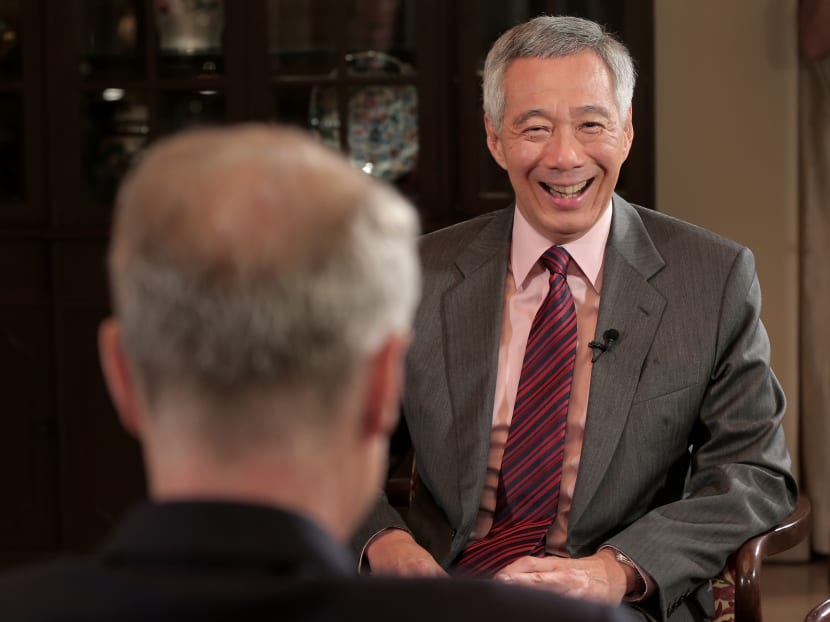Despite TPP setback, Trump government unlikely to abandon Asia: PM Lee
SINGAPORE — While the United States’ withdrawal from the Trans-Pacific Partnership (TPP) is a setback for the region and raises questions about Washington’s policies, it is unlikely that the Donald Trump administration will withdraw from Asia, said Prime Minister Lee Hsien Loong.

Prime Minister Lee Hsien Loong (right) speaking in an interview on the BBC programme, HARDTalk. Photo: Ministry of Communications and Information
SINGAPORE — While the United States’ withdrawal from the Trans-Pacific Partnership (TPP) is a setback for the region and raises questions about Washington’s policies, it is unlikely that the Donald Trump administration will withdraw from Asia, said Prime Minister Lee Hsien Loong.
Speaking in an interview with the BBC aired on Wednesday (March 1), he said Singapore was disappointed that America had withdrawn from the 12-nation trade pact, because it was a hard-won deal that was carefully balanced.
“The Americans bargained hard and so did the other countries,” Mr Lee said. “Singapore particularly felt that it was important, not just economically, because it was 40 per cent of the world’s GDP (gross domestic product)brought in by the participants, but also strategically, because it can deepen America’s engagement in Asia and give a rationale for America to take a close interest in Asia and try to make things work out well in Asia.”
Asked what signal this sends with regard to America’s engagement with Asia, Mr Lee replied that, on the TPP, Mr Trump was following up on his campaign rhetoric.
“I do not believe that the administration is planning to pull back from Asia or to pull back from the world. On the contrary, he said he wants a muscular engagement and we will have to see what that means,” Mr Lee added.
BBC presenter Stephen Sackur pointed out that Mr Lee had previously said that if the US went back on the TPP deal, it would be hard for anyone to believe in America, to which Mr Lee replied: “America is a reality. It is still a great power. This has put a dent in the degree to which people can be confident of America’s policies but it has happened and we have to live with it.”
To Mr Sackur’s query on whether this meant Singapore was reviewing the strength of its relationship with the US, Mr Lee said that like others in the region, the Republic is watching developments in America
closely.
“The direction of America, the political tone in the country, and how it is expressed through the electoral process and therefore produces a government which pushes that — that, we have to watch. We will have to see what the government does.”
He noted that Singapore has a “very deep relationship” with Washington, with the US being the largest investor in Singapore as well as one of its major export markets.
Both sides also enjoy close cooperation in areas such as defence and security, as well as strong people-to-people ties, and he expects this to continue.
US Defence Secretary James Mattis has been active in the region, having recently visited Japan and South Korea, said Mr Lee, noting that American Secretary of State Rex Tillerson also knows the region.
“So I think the officials in the administration are not unfamiliar with Asia or with its significance,” Mr Lee said.
“We are still hoping that, as the administration settles in, they will fine-tune their views, deepen their appreciation of what is happening in the world and we hope over time reach a more balanced appreciation of what all this involves.”
The TPP was thrown into disarray in January after Mr Trump pulled the US out of the accord in one of his administration’s first acts.
TPP rules stipulate that to take effect, it needs to be ratified by at least six states that together account for 85 per cent of the combined gross domestic product of all 12 original signatories.
The text of the agreement will therefore have to be adjusted for the TPP to come into force without the US.
Asked how Singapore views a proposal by some TPP parties to move ahead with the agreement in a “TPP Minus” format without Washington’s participation, the Prime Minister said he would not rule it out.
“If there were consensus and 12 minus one, 11 countries, say, let us go ahead and sign the thing, just minus the US, Singapore would sign.”
But he said “TPP Minus” would not be so easy to achieve.
“The Japanese in particular made very painful concessions in exchange for American concessions,” he added.
“And if you have a deal in which the Japanese have these concessions and the Americans are not a party, I think that the political balance and economic balance have shifted.”
Asked for his thoughts on Mr Trump’s rhetoric that the global trading system has stolen American jobs, Mr Lee said there are many views on the issue.
“In Singapore’s case, it has not done that to us. In America’s case, there are many American companies which have prospered because they are all over the world and therefore there is a base in America. But this is a view which a segment of Americans hold and I think the President reflects that,” he said.
Pressed on whether he was alarmed by Mr Trump’s views, Mr Lee replied that it would depend on what the American leader actually does, as campaign rhetoric was always slightly overheated.
“When the administration comes in, they settle in and they confront the realities and they have to make the choices,” said Mr Lee.






